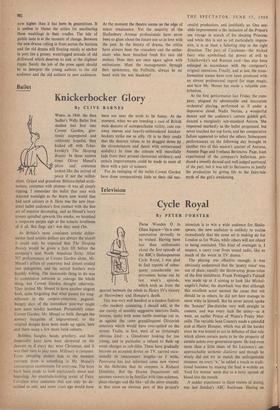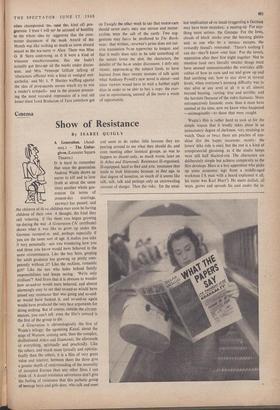Television
Cycle Royal
By PETER FORSTER This was very well handled in a modest fashion —the modesty consisting, I should add, in the use mainly of sensibly suggestive interiors (halls, taverns, tents) with some battle montage cut in, as against the :nore grandiloquent Olivierish exteriors which would have over-spilled on the screen. Faults, in fact, were of an irritatingly obvious kind: a Glendower looking far too young, and in particular a refusal to flash up scene changes as sub-titles. These have gradually become an accepted device on TV, carried occa- sionally to unnecessary lengths—as I write, Panorama has just informed some new viewer in the Hebrides that its compere is Richard Dimbleby. But the Drama Department still assumes viewers to be familiar with time-schemes, place-changes and the like—all the more stupidly in that since an obvious part of this project's intention is to win a wide audience for Shake- speare, the new audience is unlikely to realise immediately that the same set is making do for London as for Wales, while others will not object to being reminded. This kind of oversight is, I suspect, a carry over from sound radio, like so much of the worst in TV drama.
The playing ?vas effective enough; it was obviously understood that the 'poetry voice' was out of place, equally the throw-away prose-voice of the first instalment. Frank Pettingell's Falstaff was made up as if aiming to look like Michel- angelo's Judas; the drawback was that although this excellent actor seemed the cause that wit should be in others, he did not here manage to seem witty in himself. But he never jarred, spoke the 'honour' jibe-diatribe very well straight to camera, and was every inch the crony—as it were, an earlier Prince of Wales's Fruity Met- calfe. The variable Sean Connery made a splendid stab at Harry Hotspur, which was all the harder since he was bound to act in defiance of that rule which allows certain parts to be the property of certain actors over generation-spans. He had even more than a little share of Sir Laurence's un- approachably sardonic diablerie and though he wisely did not try to match the unforgettable stammer on every `w,' he added a touch to tradi- tional business by making the final w-wobble on `food for worms' seem due to a toxic uprush of blood into the mouth.
A sadder experience in these realms of daring was last Sunday's ABC Bookman. Having so often championed rats (and this kind of) pro- gramme I trust I will not be accused of hostility to the whole idea by .uggestine that the com- mittee discussion of the book Award of the Month was like nothing so much as some absurd sequel to the tea-oarty 'r Alice. There was Miss G. B Stern confessing. as it it were a kind of winsome mischievousness, that she hadn't actually got thro•tsn all the nooks under discus- sion. and Mrs Penelope UMW talking of 'characters afflicted with a kind of vestigial mel- ancholia: and Mr L P Hartley waffling against the idea of propaganda novels which try to win a reader's sympattiv and in the process present- ing the most rounded impression of a real old Tosser since Lord Brabazon of Tara somehow got on Tonight the other week to say that motor-cars should never carry only one person and motor- cyclists were the salt of the earth Two sug- gestions may fairly be proffered to The Book- man: that written, reviewer's prose does not sur- vive translation frun typewriter to tongue, and that it really does help to be told something of the nature (even the plot, the characters, the details) of the box under discussion. I defy any viewer, approach' ag the subject fresh. to have learned from their twenty minutes of talk quite what Anthony Powell's new novel is about—and since viewers would have to wait a further eight days in order to be able to buy a copy. the exer- cise in opimonating seemed All the more a waste of opportunity.











































 Previous page
Previous page